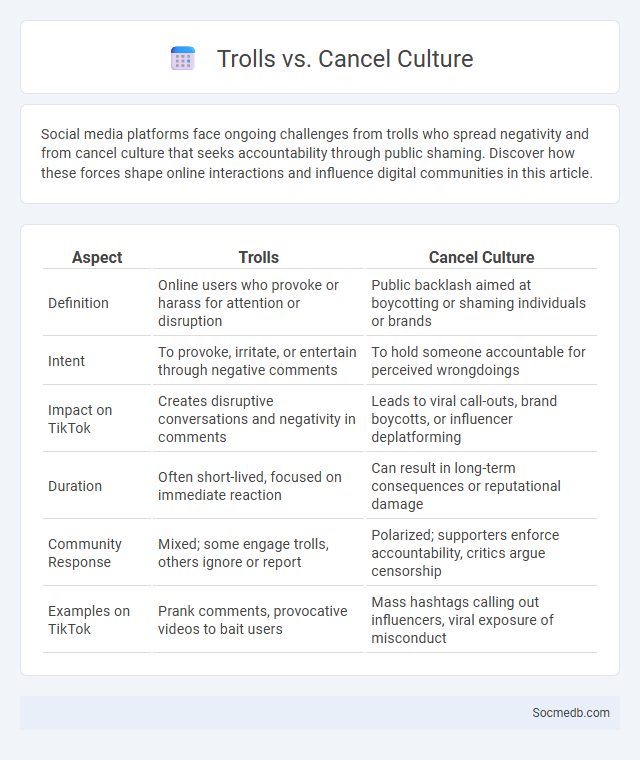
Photo illustration: Trolls vs Cancel Culture
Social media platforms face ongoing challenges from trolls who spread negativity and from cancel culture that seeks accountability through public shaming. Discover how these forces shape online interactions and influence digital communities in this article.
Table of Comparison
| Aspect | Trolls | Cancel Culture |
|---|---|---|
| Definition | Online users who provoke or harass for attention or disruption | Public backlash aimed at boycotting or shaming individuals or brands |
| Intent | To provoke, irritate, or entertain through negative comments | To hold someone accountable for perceived wrongdoings |
| Impact on TikTok | Creates disruptive conversations and negativity in comments | Leads to viral call-outs, brand boycotts, or influencer deplatforming |
| Duration | Often short-lived, focused on immediate reaction | Can result in long-term consequences or reputational damage |
| Community Response | Mixed; some engage trolls, others ignore or report | Polarized; supporters enforce accountability, critics argue censorship |
| Examples on TikTok | Prank comments, provocative videos to bait users | Mass hashtags calling out influencers, viral exposure of misconduct |
Understanding Trolls: Origins and Motivations
Trolls on social media often emerge from a desire to provoke reactions or disrupt online communities, driven by anonymity and a lack of accountability. Understanding their origins involves recognizing psychological factors such as boredom, insecurity, or a need for attention, which fuel their behavior. Your ability to identify these motivations can help mitigate the impact of trolling and foster healthier digital interactions.
The Rise and Impact of Cancel Culture
Cancel culture has transformed social media by empowering users to hold public figures and brands accountable for controversial actions or statements. Your online presence can rapidly be affected as collective user actions lead to boycotts, deplatforming, or widespread criticism. This phenomenon shapes digital discourse, influencing societal values and corporate behavior on platforms like Twitter, Instagram, and TikTok.
Trolls vs Cancel Culture: Key Differences
Trolls engage in provocative or inflammatory behavior on social media to elicit emotional responses, often targeting individuals with insults or misleading comments. Cancel culture involves collective social media actions aimed at holding individuals or brands accountable for perceived offensive behavior through boycotts or public shaming. While trolls seek disruption and personal amusement, cancel culture focuses on social accountability and consequences for controversial actions.
Online Anonymity: Fueling Troll Behavior
Online anonymity creates an environment where individuals feel shielded from accountability, often leading to increased troll behavior on social media platforms. Studies show that anonymity reduces social inhibitions, encouraging users to engage in offensive or disruptive comments without fear of personal repercussions. Platforms like Twitter and Reddit have implemented moderation tools to counteract the negative effects of anonymous interactions on community well-being.
Cancel Culture’s Role in Accountability or Overreach
Cancel Culture plays a pivotal role in holding public figures and institutions accountable by spotlighting harmful behavior and demanding consequences. However, it often risks overreach through rapid judgments on incomplete information, potentially harming innocent reputations. Understanding this balance helps you navigate social media responsibly, ensuring that calls for accountability remain fair and constructive.
Social Media Platforms: Battlegrounds for Trolls and Cancelers
Social media platforms have become dynamic battlegrounds where trolls and cancel culture activists fiercely compete to influence public discourse. These digital arenas are shaped by algorithms that amplify viral content, often escalating conflicts and polarizing users. Understanding user behavior and moderation policies is crucial to navigating the complex interactions between online harassment and social accountability.
Psychological Effects on Targets: Trolls vs Cancel Culture
Social media exposes targets to various psychological effects, with trolls often causing acute stress through harassment and ridicule, leading to anxiety and lowered self-esteem. Cancel culture amplifies social exclusion and public shaming, which can result in long-term emotional trauma, social withdrawal, and identity crises. The contrasting dynamics between repetitive trolling and collective condemnation highlight distinct mental health challenges faced by individuals in digital environments.
Defending Free Speech vs Preventing Harm
Balancing free speech and harm prevention on social media requires carefully designed content policies that protect users' rights while mitigating misinformation, hate speech, and harassment. Algorithms and moderation tools must prioritize context and intent to avoid censorship of legitimate expression without enabling harmful behaviors. Transparent enforcement and user empowerment foster safer platforms that uphold democratic discourse and diverse viewpoints.
Navigating the Cycle: When Cancel Culture Becomes Trolling
Understanding the fine line between cancel culture and trolling is crucial in today's social media environment, where public accountability can quickly spiral into harassment. Navigating this cycle requires recognizing when calls for responsibility turn into targeted attacks that silence constructive dialogue. Your awareness of these dynamics helps promote respectful online interactions and prevents the misuse of cancel culture as a tool for trolling.
Building Resilience: Coping with Trolls and Cancel Culture
Building resilience against social media trolls and cancel culture requires developing strong emotional boundaries and practicing digital self-care. Your ability to critically evaluate online interactions helps in distinguishing constructive criticism from harmful attacks, reducing the impact on your mental health. Engaging with supportive communities and setting clear personal limits on social media use enhances coping strategies and fosters long-term well-being.
 socmedb.com
socmedb.com